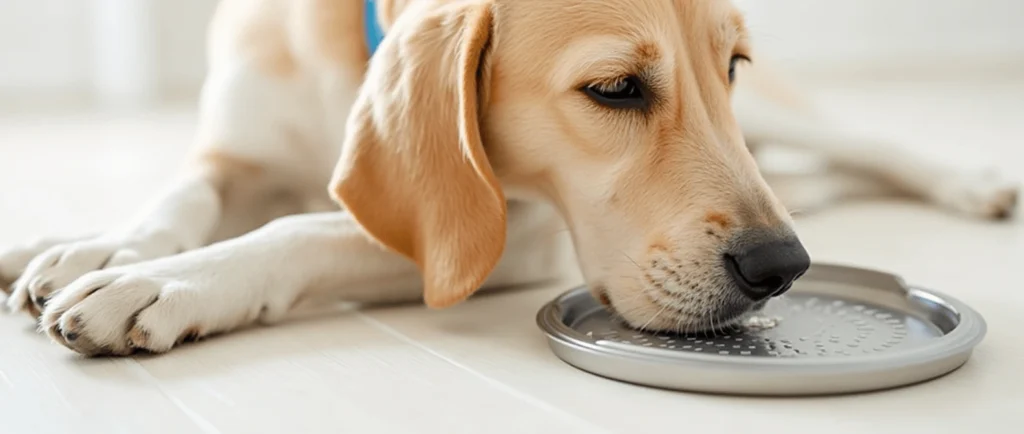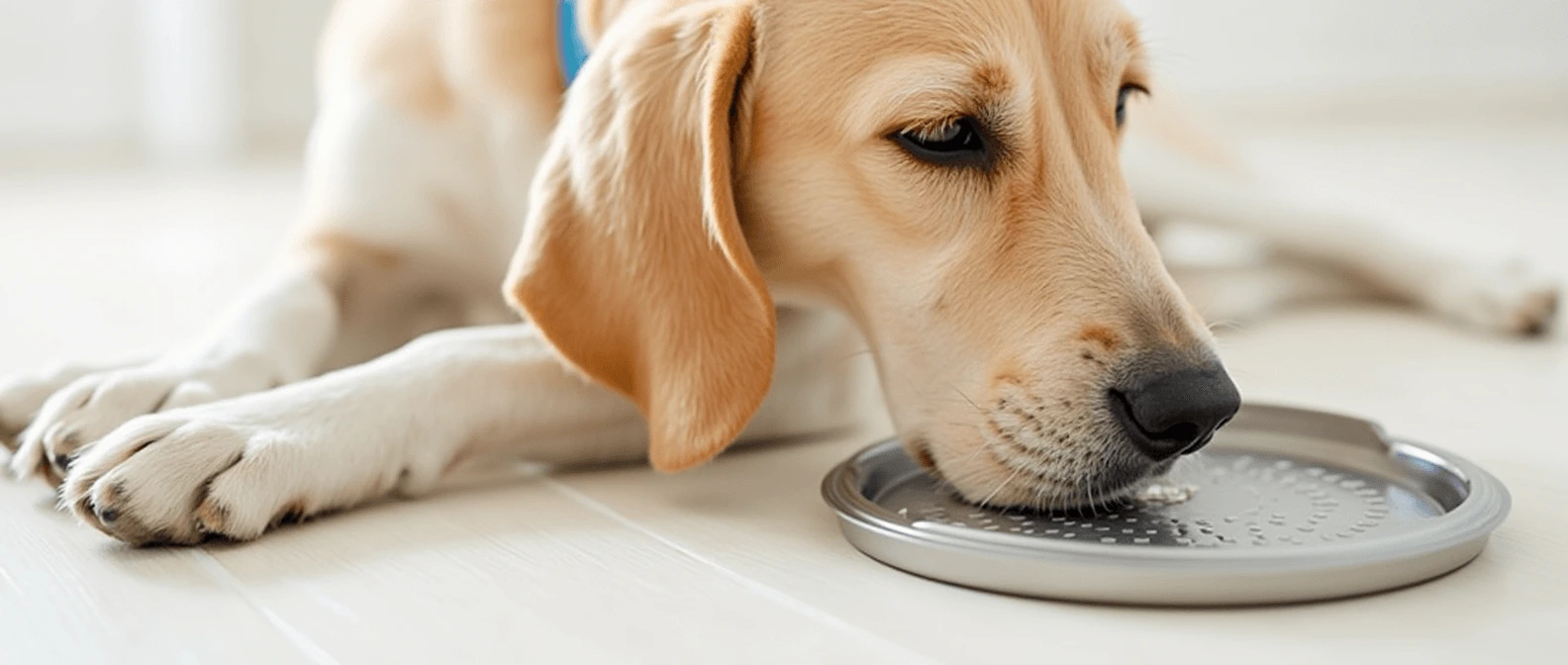why do dogs throw up As a dog owner, seeing your pet vomit clear liquid can be scary. It’s a moment that fills you with worry and uncertainty. But, you’re not alone. Knowing why dogs throw up clear liquid can help you feel more in control.
Clear liquid vomit might look alarming, but it’s often a normal sign. It can be made of saliva, water, or even look foamy. While it’s okay if your dog vomits sometimes, if it keeps happening, you should pay close attention.
It’s important to understand why dogs throw up clear liquid. Some times it’s nothing to worry about, but other times it could mean there’s a health issue. If you notice your dog vomiting a lot, it’s best to see a vet.

Key Takeaways
- Clear liquid vomit is common and can have multiple causes
- Occasional vomiting might be normal, but repeated episodes warrant investigation
- Water consumption and dietary habits can trigger clear liquid vomiting
- Some dog vomiting causes are minor, while others require medical attention
- Monitoring your dog’s overall health and behavior is essential
Understanding Clear Liquid Vomit in Dogs
Dog nausea reasons can be complex and varied. Clear liquid vomit might seem harmless, but it can signal important health information about your canine companion. Understanding the nuances of canine vomiting triggers helps pet owners distinguish between normal and potentially serious situations.
Identifying Different Types of Clear Vomit
Not all clear liquid vomit is identical. Dogs can expel various types of clear substances that might indicate different underlying conditions:
- Watery vomit: Often related to hydration issues
- Foamy liquid: Could suggest acid reflux or stomach irritation
- Slimy discharge: Might indicate mucus production from gastrointestinal inflammation
Vomiting vs. Regurgitation: Key Differences
Pet owners frequently confuse vomiting and regurgitation. Vomiting involves forceful expulsion of stomach contents, while regurgitation is a passive release of undigested food or liquid.
| Characteristic | Vomiting | Regurgitation |
|---|---|---|
| Muscle Involvement | Abdominal muscle contractions | No muscle contractions |
| Warning Signs | Heaving, drooling | Minimal physical indication |
| Content Appearance | Partially digested | Undigested |
When Clear Vomit Requires Attention
While occasional clear liquid vomiting might be normal, certain scenarios demand veterinary intervention. Persistent vomiting, especially when accompanied by additional symptoms like lethargy or loss of appetite, could indicate serious health concerns.
Veterinary experts recommend monitoring frequency and accompanying symptoms to determine the potential severity of clear liquid vomit.
Your dog’s health is paramount. Pay close attention to any changes in vomiting patterns and consult a professional if you’re uncertain about your pet’s condition.
Why Do Dogs Throw Up: Common Triggers and Causes
Knowing why dogs vomit can help you spot when they need a vet. Dogs face many reasons for stomach upset, from small problems to serious health issues.
The main reasons dogs vomit include:
- Dietary indiscretion (eating things they shouldn’t)
- Sudden diet changes
- Food allergies
- Stress and anxiety
- Eating things they shouldn’t
About 70% of vomiting cases are due to eating things they shouldn’t. Motion sickness affects 15-20% of dogs, leading to stomach upset during travel.
| Cause Category | Percentage of Vomiting Cases |
|---|---|
| Dietary Issues | 70% |
| Gastrointestinal Infections | 20-30% |
| Food Allergies | 5-10% |
| Stress/Anxiety | 5% |
More serious health problems can also make dogs vomit, such as:
- Pancreatitis (affects 5-10% of dogs)
- Intestinal parasites
- Gastric obstruction
- Infectious diseases
“Early detection and understanding of vomiting triggers can prevent potential health complications in dogs.”
Keep an eye on your dog’s symptoms. If they keep vomiting or show other worrying signs, see a vet.
Empty Stomach Syndrome and Bile Production
Dog diet vomiting often stems from an empty stomach. This is a common problem that confuses many pet owners. Morning or late-night vomiting in puppies might be due to Empty Stomach Syndrome.
Understanding this condition is key for pet owners. It involves bile production and how it affects stomach acids and digestion.
Morning Sickness in Dogs
Bilious Vomiting Syndrome (BVS) affects dogs of all ages and breeds. It is marked by:
- Yellow-tinged fluid vomiting
- Typically occurring early morning
- Dogs appearing otherwise healthy
Relationship Between Feeding Schedule and Vomiting
Your dog’s eating schedule affects bile production and vomiting. Studies show that about 90% of cases can be managed with the right diet.
| Feeding Strategy | Potential Vomiting Reduction |
|---|---|
| Late Evening Meal | Up to 75% reduction |
| Multiple Small Meals | 60% improvement |
| Consistent Feeding Times | 50% symptom management |
“A well-planned feeding schedule can significantly reduce the likelihood of empty stomach syndrome in dogs.” – Veterinary Nutrition Experts
If your puppy keeps vomiting, even with diet changes, see a vet. A vet can find the cause and create a treatment plan.
Excessive Water Consumption as a Trigger
Dog vomiting can happen from simple actions like drinking water too fast. This rapid water intake can surprise many pet owners.
It’s important to understand how much water your dog needs. Most dogs need about 1 ounce of water per pound of body weight each day. Drinking too much water can upset your dog’s stomach, causing clear liquid vomit.
“Drinking water too fast can cause more harm than good for your furry friend.”

Water Intake Warning Signs
- Drinking more than 50 ml per kg in 24 hours
- Gulping water without pausing
- Showing signs of increased thirst
- Regurgitating clear liquid after drinking
Potential Reasons for Excessive Drinking
| Medical Condition | Potential Water Intake Impact |
|---|---|
| Diabetes | Increased thirst and urination |
| Kidney Disease | Altered fluid regulation |
| Cushing’s Disease | Excessive water consumption |
To stop dog vomiting from water intake, try these tips:
- Use slow-feed water bowls
- Offer smaller, frequent water amounts
- Monitor your dog’s drinking patterns
- Consult a veterinarian if unusual drinking behaviors persist
Remember, persistent vomiting after water consumption could signal an underlying health issue requiring professional medical evaluation.
Serious Medical Conditions Causing Clear Vomit
Dog illness vomiting can signal serious health issues that need quick action. Clear liquid vomit might look harmless but could hide serious health problems. These problems need a vet’s help right away.
Gastrointestinal Obstruction: A Critical Concern
Gastrointestinal obstruction is a serious emergency for dogs. Dogs with this issue may show:
- Repeated attempts to vomit clear liquid
- Abdominal bloating
- Inability to keep food or water down
- Visible distress or pain
Pancreatitis: Inflammatory Digestive Threat
Pancreatitis can cause dogs to vomit clear liquid often. This condition affects the pancreas and messes with digestion. Symptoms include:
- Persistent clear liquid vomiting
- Significant abdominal pain
- Complete loss of appetite
- Noticeable lethargy
Bloat (Gastric Dilatation-Volvulus): Life-Threatening Condition
Bloat, or gastric dilatation-volvulus (GDV), is very dangerous. This condition can be fatal if not treated right away.
| Condition | Symptoms | Urgency Level |
|---|---|---|
| Gastrointestinal Obstruction | Clear liquid vomiting, bloating | High |
| Pancreatitis | Repeated vomiting, abdominal pain | Critical |
| Bloat (GDV) | Attempted vomiting, extreme distension | Emergency |
“Any persistent clear liquid vomiting warrants immediate veterinary evaluation to rule out serious conditions.” – Veterinary Experts
If your dog keeps vomiting clear liquid and shows signs like lethargy, pain, or behavior changes, call your vet fast. Quick action can save your dog’s life in these urgent cases.
Toxin Exposure and Foreign Objects
Dog vomiting can often be caused by toxic substances and swallowing foreign objects. Your dog’s upset stomach might be a warning of poisoning or harmful object interactions.
Household toxins are a big risk for dogs. Dogs, being curious, might accidentally eat harmful things that upset their stomachs.
- Common household toxins include:
- Antifreeze (ethylene glycol)
- Chocolate
- Xylitol-containing products
- Certain houseplants
- Cleaning chemicals
The dangers are clear. Even a small amount of ethylene glycol, like four ounces, can be deadly for a 60-pound dog. Symptoms can show up in 30 minutes to 12 hours after they eat it.
| Toxic Substance | Potential Impact | Toxic Threshold |
|---|---|---|
| Chocolate | Severe digestive distress | 1 oz per 20 pounds body weight |
| Xylitol | Potential fatal blood sugar drop | Small quantities can be dangerous |
| Antifreeze | Potentially lethal | 4 ounces can kill a 60-pound dog |
“Prevention is always better than cure when protecting your dog from toxic substances.”

Swallowing foreign objects is another big cause of dog vomiting. Small things can block the intestines, causing severe stomach problems and possibly needing surgery. Look for signs like constant vomiting, tiredness, and changes in eating habits.
It’s very important to see a vet right away if you think your dog ate something toxic or swallowed something it shouldn’t. Quick action can stop serious health problems and might even save your dog’s life.
Infectious Diseases and Parasites
Dog illness vomiting can come from many sources. These include infectious diseases and parasites. Knowing about these threats helps keep your pet safe. It also tells you when to seek vet help.
Parvovirus: A Serious Threat to Puppies
Puppy vomiting from parvovirus is a big worry. This virus is very contagious. It mainly affects dogs and puppies who haven’t been vaccinated or have weak immune systems.
- Extreme contagiousness among canine populations
- Potentially fatal if left untreated
- Significant risk for young dogs under six months
Common Parasitic Infections
Intestinal parasites can upset a dog’s stomach. Studies show that up to 30% of dogs might get these infections in some areas.
| Parasite Type | Prevalence | Potential Symptoms |
|---|---|---|
| Roundworms | High | Vomiting, Weight Loss |
| Hookworms | Moderate | Digestive Disruption |
| Coccidia | Variable | Diarrhea in Puppies |
Bacterial and Viral Infections
Many bacterial and viral infections can cause vomiting in dogs. Vets suggest regular check-ups to catch and prevent health problems early.
“Prevention is always better than cure when protecting your dog from infectious diseases.” – Veterinary Health Association
About 10-15% of dogs will vomit at some point. This shows how crucial it is to know about these threats. Keeping up with your dog’s health is key.
When to Seek Immediate Veterinary Care
Dog vomiting treatment needs quick action and careful watching. About 30% of dogs that vomit will need to stay in the hospital. It’s key to know when to get help fast for your pet’s health.
Here are the times when you should get your dog to the vet right away:
- Vomiting more than 2-3 times in a short time
- Clear liquid vomit with blood or dark, coffee-ground-like substance
- Your dog seems very tired or weak
- They keep vomiting and also have diarrhea
- They’re trying hard to vomit but nothing comes out, or they might have bloat
Vets say that if your dog keeps vomiting, they can get very dehydrated. About 40% of dogs with chronic vomiting will lose weight or get dehydrated if not treated quickly.
| Vomiting Severity | Recommended Action |
|---|---|
| Occasional, isolated incident | Monitor closely, consider bland diet |
| Frequent or accompanied by other symptoms | Immediate veterinary consultation |
| Presence of blood or severe weakness | Emergency veterinary care |
“Early intervention can prevent serious complications and potentially save your dog’s life.” – Veterinary Health Association
While 60% of sudden vomiting cases might not need help, your dog’s specific symptoms and health matter. Trust your gut and get professional help if you think your dog needs more than home care.
Treatment Options and Medical Interventions
If your dog keeps vomiting, finding the right treatment is key. Vets use a detailed plan that fits your pet’s needs.
Medication Approaches
Dealing with dog vomiting needs careful medical help. Vets suggest several treatments:
- Anti-nausea meds to ease stomach pain
- Antacids to cut down acid
- Drugs to heal the stomach lining
At first, injectable meds are often used. They help stop more vomiting and work fast.
Fluid Therapy Management
Dehydration is a big risk with long vomiting spells. Vets work to fix it with:
- Fluids given under the skin
- IV fluids for serious cases
- Watching how much fluid is in and out
Dietary Rehabilitation
Managing dog vomiting also means the right food:
- Starting with bland, easy-to-digest foods
- Slowly adding back regular food
- Eating small meals often to ease stomach stress
“The key is patience and careful observation during your dog’s recovery process.”
If symptoms don’t get better, vets might do more tests. This helps find the cause and plan a better treatment.
Prevention Strategies and Home Care
To keep your dog healthy, you need to be proactive. Start by making their living space safe and controlled. This helps prevent health risks.
- Secure household chemicals and toxic substances
- Remove potentially dangerous plants
- Monitor your dog’s eating habits
- Maintain consistent feeding schedules
Managing your dog’s diet is key to avoiding stomach upset. Studies show that 10% of dogs get sick from sudden diet changes. So, make slow food changes and choose high-quality food.
Consistent care and prevention are key to maintaining your dog’s digestive health.
Here are some important prevention steps:
- Regular vet visits (1-2 times a year)
- Controlled diet with few treats
- Quickly remove hazards
- Watch food and water closely
| Prevention Strategy | Potential Risk Reduction |
|---|---|
| Secure garbage | 50% reduction in dietary indiscretion |
| Parasite protection | 75% decrease in GI infections |
| Gradual diet transitions | 80% prevention of dietary upset |
About 80% of dog owners face dietary issues. Being careful at home can greatly lower the chance of your dog getting sick.
Dietary Management and Feeding Tips
Managing your dog’s diet is key to preventing vomiting and digestive issues. A good feeding plan can help avoid stomach problems and keep your pet healthy.
Crafting the Perfect Feeding Schedule
Creating a good feeding routine is vital for preventing vomiting. Here are some important tips:
- Feed smaller, more frequent meals throughout the day
- Provide a meal just before bedtime and immediately after waking
- Aim for at least 75% of food intake from balanced, AAFCO-certified nutrition
Recommended Food Types
Choosing the right food can greatly lower vomiting risks. Your dog’s diet should include:
- Dry kibble as the primary nutrition source
- Occasional canned food (up to 25% of diet) for hydration
- Bland diet options like boiled chicken, rice, and low-fat cottage cheese
Hydration and Digestive Health
Proper hydration is crucial for your dog’s digestive health. Follow these guidelines:
- Ensure constant access to fresh, clean water
- Monitor water intake to prevent excessive drinking
- Use slow-feeder bowls to regulate eating pace
*A balanced diet and consistent feeding schedule are your best defense against dog diet vomiting.*
Always talk to your vet for dietary advice that fits your dog’s health needs and conditions.
Conclusion
It’s important to know why dogs throw up to keep them healthy. Most times, when dogs vomit clear liquid, it’s not a big deal. But, acting fast can really help your dog feel better.
Going to the vet regularly is key to avoiding big health problems. Watching what your dog eats, drinks, and how they act helps catch issues early. About 70% of the time, vomiting isn’t a big worry, but 30% might need a vet’s help.
If your dog keeps vomiting or it looks different, listen to your gut. Get them to the vet right away if you see blood, something they shouldn’t have eaten, or if they have a fever or act strangely. Keeping your dog’s diet right, managing stress, and making sure they’re safe is the best way to keep them healthy.
Table of Contents
Being aware and quick to act can really lower the risks of your dog getting sick from vomiting. Keep learning, keep watching your dog, and always put their health first.

